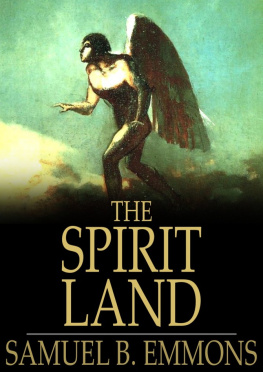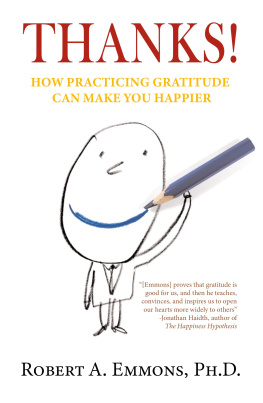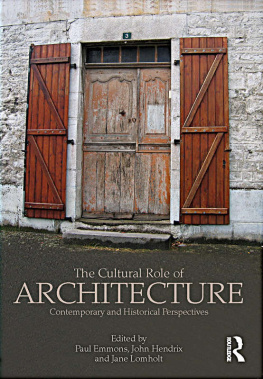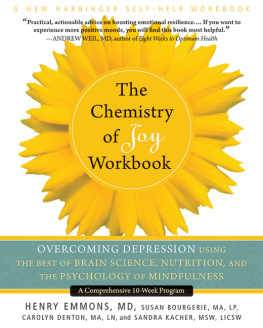THE SPIRIT LAND
* * *
SAMUEL B. EMMONS

*
The Spirit Land
First published in 1857
Epub ISBN 978-1-77667-105-2
Also available:
PDF ISBN 978-1-77667-106-9
2013 The Floating Press and its licensors. All rights reserved.
While every effort has been used to ensure the accuracy and reliability of the information contained in The Floating Press edition of this book, The Floating Press does not assume liability or responsibility for any errors or omissions in this book. The Floating Press does not accept responsibility for loss suffered as a result of reliance upon the accuracy or currency of information contained in this book. Do not use while operating a motor vehicle or heavy equipment. Many suitcases look alike.
Visit www.thefloatingpress.com
Contents
*
To the Reader
*
This volume is intended as an antidote to a species of errors that havebeen rife in every age of the Christian church. Notwithstanding thedisclosures the Most High made of himself to his ancient people, theywere yet prone to turn aside from the worship of the true God, tofollow the lying spirits of the prophets of Baal, and other deceivers,from the days of Moses till the destruction of Jerusalem. So, likewise,under the Christian dispensation, there has been a succession ofAntichrists, until their name is legion, whose teachings have cloudedthe understandings and blinded the moral perceptions of men, subvertingthe faith of many whose mountains stood strong, and who had beencounted the chosen people of God.
The present is viewed as an age of isms. Men have run mad, and arechasing phantoms. They are roaming round to find some fulcrum tooverturn the church and the Bible; they are imagining they arereceiving utterances from heaven, when nothing is uttered but thevain fantasies of their own minds and hearts. It is the grossestfanaticismfanaticism in its most frightful form, leading its unhappyvictims, not unfrequently, to flagrant crimes, and to the most horridof allthat of self-destruction.
These pages are submitted to the public with the counsel of the wisestand best of all ages, that, amid the wily arts of the adversary, weshould cling to the word of God, the Bible of our fathers, as the onlysafe and infallible guide of faith and practice.
Note
*
We would here give credit to the principal works from which valuableand important matter has been selected for these pages: Whitman'sPopular Superstitions; Upham's Lectures upon Witchcraft; ChristianFreeman and Family Visitor; Abercrombie on the Intellectual Powers;Influence of the Imagination upon the Nervous System, by Rev. GrantPowers; Life of Adam Clarke; Hayward's Book of all Religions; Milleron the Second Coming of Christ; Borrow's Gypsies of Spain; Stone onFalse Prophets and Christs; Dickens's Household Words; Capron andBarron on the Spirit Knockings; Dick on the Improvement of Society;Revelations of A. J. Davis; The Great Harmonia; Rogers on Human andMundane Agents; Miss Crowe's Night Side of Nature; SpiritualTelegraph, &c.
As the work embraces a mass of facts of an absorbing and intenselyinteresting character, we trust that it will commend itself to anenlightened and judicious public.
THE AUTHOR.
PART FIRST
*
Introduction - The Object of this Work
*
The object of this treatise upon some of the various errors of the pastand present ages is to explain their natureinvestigate theirorigindescribe their injurious effectsand to offer and recommendthe necessary measures for their banishment. Most persons, even thosewho have been well educated, can call to mind the avidity with which,in their days of childhood, they listened to the nursery tales ofgiants, dwarfs, ghosts, fairies, and witches. The effects of thesejuvenile impressions are not easily effaced from the mind, and theimpressions themselves are but rarely, if ever, forgotten.
To doubt, in former times, the power of charms, and the veracity ofomens, and ghost stories, was deemed little less than atheism. Theterror caused by them imbittered the lives of persons of all ages. Iteither served to shut them out of their own houses, or deterred themfrom going abroad after it was dark. The room in which the head of afamily died was for a long time untenanted; particularly if he diedwithout a will, or was supposed to have entertained any peculiarreligious opinions. If any disconsolate maiden, or love-crossedbachelor, became the instrument of their own death, the room where thefatal deed was committed was rendered forever uninhabitable, and notunfrequently nailed up. If a drunken farmer, returning from market,fell from his horse, and by the fall broke his own neck, that spot,ever after, was haunted and impassable. In truth, there was scarcely aby-lane or cross-way but had its ghost, which appeared in the shape ofa headless cow or horse. Ghosts of a higher degree rode in coaches,drawn by six headless horses, and driven by a headless coachman. As forthe churchyards, the legitimate habitations of spectres, clothed all inwhite, the numbers who swarmed there equalled the living parishioners;and to pass such a place in the night was more perilous than thestorming of Badajos.
Confuted and ridiculed as these opinions have been, in later days, theseeds of them are still widely diffused, and at times attempt to springup in all their earlier excess. In the year 1832, crowds of men, women,and children flocked to the village of Waltham, a few miles fromBoston, to see a ghost which was said to make its appearance towardsmidnight, walking to and fro in a turf meadow, declaring itself, inunearthly tones, to be the spirit of a murdered man, whose bones lay ina mud hole near by. The excitement spread many miles around, andhundreds from the city and neighboring towns hied to the spot, witheyes agape, to behold the solemn visitor from the spirit world. Andsuch was the credulity inspired in the minds of the people, that aclergyman in the vicinity declared from his pulpit, on the followingSabbath, that the awful crime of murder had been revealed by the spiritwhich had appeared in Waltham! Such is the excitability of themind, and its tendency (notwithstanding the light that has beenscattered abroad) to give credence to all the vagaries and nonsense ofthe darker ages.
Chapter I - The Origin of Popular Superstitions
*
Ignorance of correct reasoning has undoubtedly given rise to manysuperstitions. Inductive reasoning teaches us to infer generalconclusions from particular facts which have come under ourobservation. This definition may be illustrated by an example. You knowthat water boils on the application of a certain degree of heat. Youhave seen this experiment tried many times without a single failure.You therefore conclude that water will always boil on the applicationof this degree of heat, although you have seen it applied but to asmall portion of the water in creation. Thus you draw this generalconclusion from the few particular facts which you have witnessed.But had you noticed several failures in the trial, your conclusionswould have been doubtful. And if the experiment had failed ninety-ninecases out of a hundred, you would have adopted an opposite conclusion.You would have said that the application of the specified degree ofheat would not boil water. In this way, logical reasoning leads to thediscovery of truth. Now, apply this principle of sound reasoning to thewhole mass of pretended












